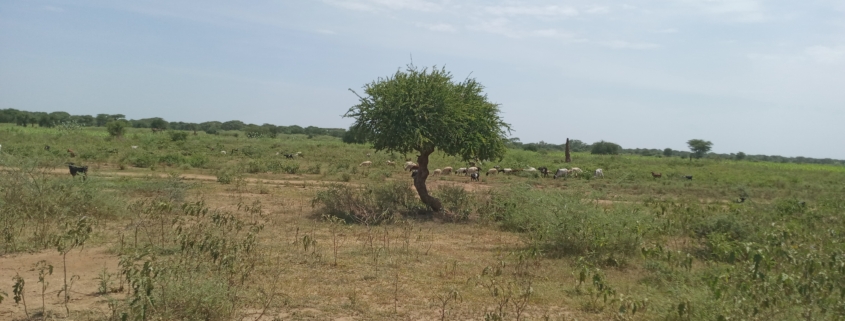This report covers the intensifying crisis related to migration of Dinka Bor herders from Jonglei State to the Equatoria region due to recurring floods. Specifically, it investigates the effects of the catastrophic floods that have since July 2020 forced herders to move their cattle to higher ground. While some returned to Bor after the receding floods, others faced pressure from national and state governments to leave the Equatoria region. However, a faction of herders remains…
repository
CSRF Research Repository
The CSRF Research Repository aims to support greater contextual knowledge for policy makers, programme managers, and implementers by providing a searchable repository of research, analysis, and resources, and providing periodic updates on new research and analysis.
Kapoeta, a semi-arid area,[1] has been experiencing severe drought conditions since 2021 caused by climate change.[2] The changing conditions have reportedly resulted in the spread of invasive weed species in the last two to three years. These include Beku (local name) with the scientific name Prosopis Juliflora and Abonglogir (local name) with the scientific name Parthenium. Invading farms, grazing land and roadsides, these weeds have a devastating impact on livelihoods, such as farming…
This interactive report explores how flooding intersects with displacement and violence in South Sudan. Using the case of Jonglei state, the report finds that the recurrent flooding have displaced hundreds of thousands of Jonglei’s population to Equatoria region, and this has sparked competition and conflict over resources, especially between migrating herders and the host communities. Finally, it outlines recommendations on how aid agencies and donors can address these flood-induced tensions, including a broader conflict in…
This context update aims to support a conflict-sensitive approach to decision making by aid actors and policy makers in South Sudan through an improved understanding of South Sudan’s context, conflict dynamics and how aid actors interact with the context. The analysis by the Conflict Sensitivity Resource Facility (CSRF) is based on secondary data from various sources and qualitative data from some key informant interviews. This analysis covers a 3-6 month period (October 2021-March 2022), and…
This report offers a consolidated account of MSF’s experience in South Sudan since 9 July 2011. In so doing, it seeks to serve as a record and reminder of the human toll of violence, since independence, as seen by MSF – through its staff and patients. It is based on interviews with more than 100 of MSF’s South Sudanese staff, operational research, internal reports, and public communications over the last decade. It also draws on…
This study examined how good governance could be a means to peaceful co-existence in Eastern Equatoria State, South Sudan. The study was anchored on three theories of; good governance, collaborative governance and democratic peace. The key findings of the study were that bad governance and poor leadership hinder peaceful coexistence, participation of citizens in decision making processes, awareness of citizens in existing policies and legislations, the rule of law, and use of available resources to…
This case study sets out learning from programmatic engagement from the UK’s Peacebuilding Opportunities Fund (POF) among the Otuho people of Eastern Equatoria State. The programme promoted a cultural engagement process aimed to strengthen women’s peace and security at a time when Otuho society undergoes a 22-year cycle of generational change when leadership structures are renewed. This case study draws on POF experience from this engagement, sharing learning associated with influencing cultural processes through public…
This report examines the ongoing conflict in the Equatoria region of South Sudan and delineates the key actors and interests that will need to be accommodated in any attempt to resolve the crisis. Based on field research and interviews conducted in Equatoria and neighboring Uganda, the Democratic Republic of the Congo, and Kenya from 2016 to 2020, the report was sponsored by the Africa Center at the United States Institute of Peace. Download
A rebellion in Equatoria, South Sudan’s southernmost region, is undermining the already troubled peace between the main belligerents in its civil war. Mediators should push for a wider compact that accommodates Equatorian grievances and includes the insurgent general in talks about the country’s political future. What’s new? Despite a 2018 deal bringing South Sudan’s main warring parties into a ceasefire and unity government, a rebellion in the southern multi-ethnic Equatoria region fights on. Its leader, Thomas…
This report explores the dynamics of local conflict and governance through the recent civil war across South Sudan, using five ‘case study’ locations: Gogrial, Malakal, Leer, Nimule, and Abyei. Evident through this research was that, while public authority – both formal and informal – and political marketplace dynamics, varied considerably across the five research sites, a number of important commonalities also emerged in some or all locations, regarding their evolving roles through the conflict(s) and…

Some Infos
Lorem ipsum dolor sit amet, consectetuer adipiscing elit. Aenean commodo ligula eget dolor.
Pages
- About Our County Profiles
- Blog
- Case Studies Grid
- Central Equatoria
- Conflict Sensitivity Resource Facility South Sudan
- Contact Us
- Contribute a Repository Article
- County Profile HTML links
- County Profiles
- COVID-19 HUB
- Covid-19 information page
- CSRF About Us
- CSRF Helpdesk
- CSRF Helpdesk Form
- CSRF Login
- Dashboard
- Deliverables
- Demo
- Events
- Forgot password
- Guides, Tools and Checklists
- Helpdesk
- Home
- Latest
- Looker Studio
- Subscribe

